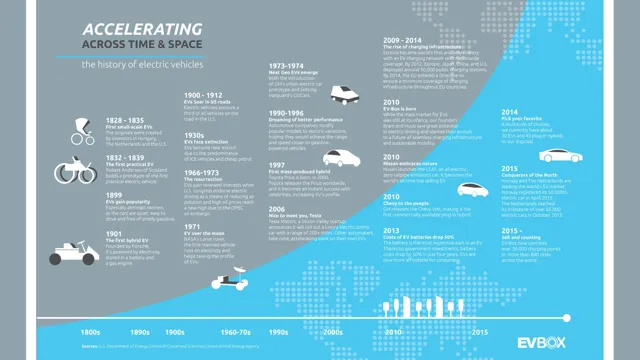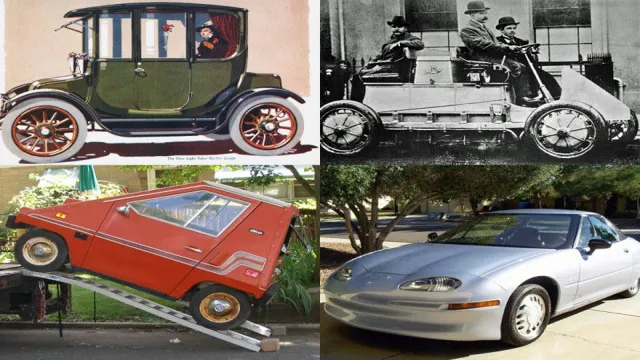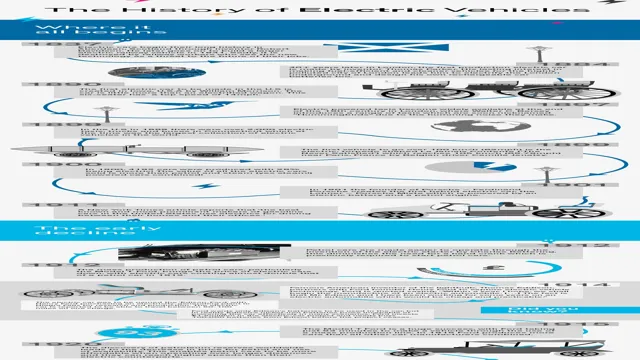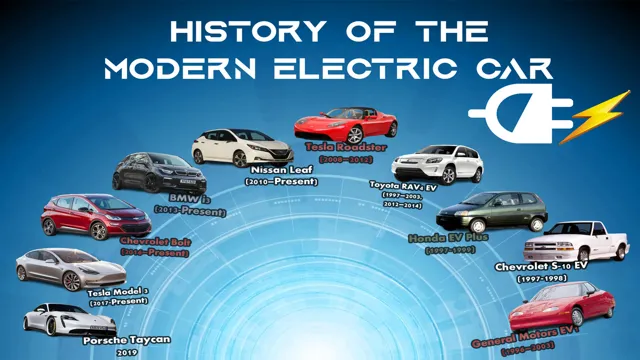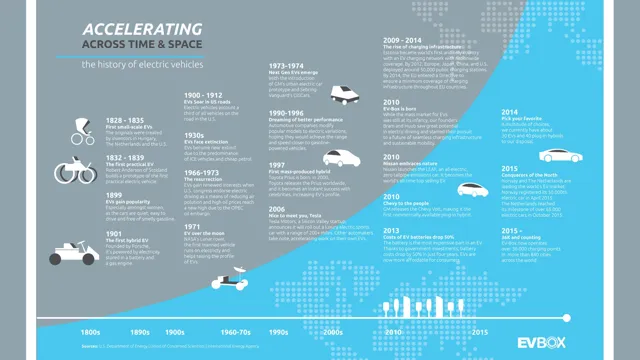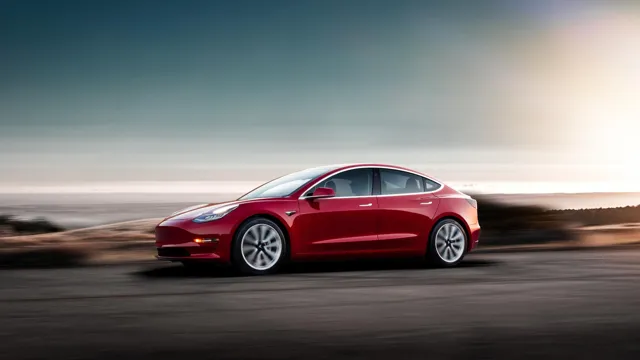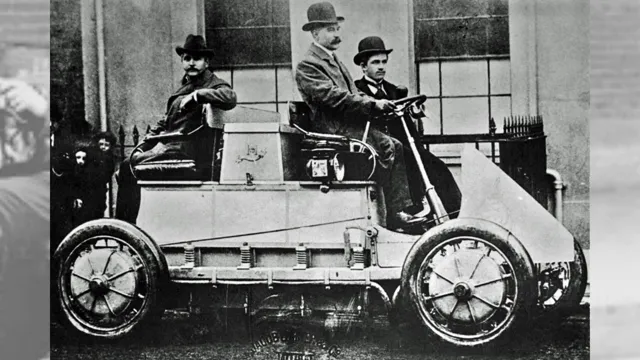The Electrifying Rise of Electric Cars: A Comprehensive PDF History
Electric cars have come a long way since their conception in the early 19th century. From being mere curiosities to becoming a feasible mode of transportation, the evolution of electric cars has been nothing short of remarkable. With advancements in technology and increasing awareness about the ill effects of fossil fuels, electric cars have become the future of mobility.
In this blog, we will take a closer look at the history and evolution of electric cars, while exploring the benefits of this mode of transportation. From Thomas Davenport’s invention of the first ever electric motor in 1834, to Elon Musk’s vision for a zero-emission future, electric cars have witnessed quite the journey. We will delve into the reasons why electric cars are gaining popularity, including factors like eco-friendliness, energy efficiency, and low maintenance costs.
Additionally, we will also highlight the challenges and hurdles that have prevented electric cars from mass adoption. To sum it up, the evolution of electric cars is a fascinating story that has the potential to change the way we travel. Whether you are a history buff or an environmentalist, this blog will provide you with an in-depth understanding of the past, present, and future of electric cars.
So, buckle up and get ready to explore the exciting world of electric cars!
Early Beginnings
The history of electric cars has a long and interesting background. The first experiments with electric vehicles date back to the 1800s when inventors were competing to find practical alternatives to gasoline-powered cars. One of the first electric cars was developed in Britain by Thomas Parker in 1884, which was capable of reaching speeds of up to 20 miles per hour.
Over the following years, many different companies worldwide began producing electric cars, including Edison and Baker in the United States and La Jamais Contente in France. However, the limited range of these early electric cars, as well as the high price tag, made them less attractive than gasoline-powered alternatives. Despite improvements in their batteries and motors, electric cars wouldn’t become commercially competitive until much later in the 21st century.
For this reason, the history of electric cars is often characterized by fits and starts, with bursts of innovation followed by periods of stagnation. However, with growing concerns about climate change and the environmental impact of gasoline-powered vehicles, electric cars have seen a renewed interest in recent years. Access to the history of electric cars PDF can provide a detailed description of the evolution of this groundbreaking technology.
The Birth of the Electric Vehicle
Electric Vehicle The birth of the electric vehicle can be traced back to the early beginnings of the automobile industry. In fact, the first electric car was invented in the late 1800s. It was designed by a Scottish inventor named Robert Anderson.
However, it wasn’t until the turn of the 20th century that electric vehicles began to gain prominence as a viable alternative to gasoline-powered vehicles. One of the biggest advantages of electric vehicles at the time was that they were easier to operate and required less maintenance than gas-powered vehicles. They were also more environmentally friendly.
However, several factors would contribute to the decline of electric vehicles, including the rise of the internal combustion engine and the discovery of vast reserves of oil. But as the world becomes more environmentally conscious and fossil fuels become scarcer, the electric vehicle is experiencing a renaissance. Today’s electric vehicles are more powerful, efficient, and practical than ever before.
They are also helping to reduce our dependence on fossil fuels and promote a cleaner, greener future for all.
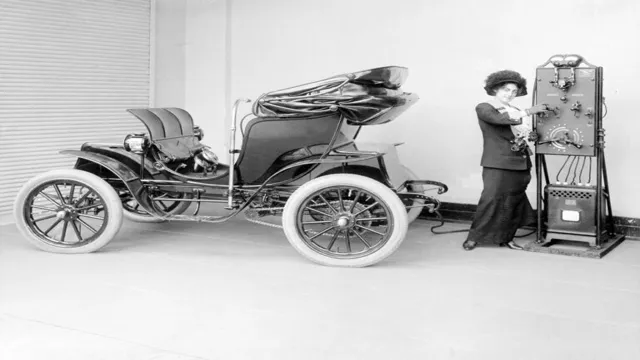
Competition with Gasoline-powered Cars
When the first electric cars appeared in the late 19th century, the competition with gasoline-powered cars was already fierce. At this time, gasoline cars were already well-established, and gasoline filling stations had appeared in many cities across Europe and America. However, despite the odds, electric cars had some advantages over their petrol-fueled counterparts.
They were quiet, running smoothly and efficiently while gas cars were loud and required constant attention. Additionally, electric cars were cleaner and easier to maintain, which made them more attractive to city dwellers. The early electric cars did not have the same range as gas-powered vehicles, but they were well-suited to urban journeys and performed well in delivery services.
However, as gasoline-powered cars improved in range and became more affordable, the electric car industry began to recede. By the 1920s, electric car manufacturing had slowed, and gasoline cars had become the dominant force on the market. Keyword: electric cars, gasoline-powered cars.
The Rise of Electric Cars in the 21st Century
The history of electric cars dates back to the 19th century, but it wasn’t until the 21st century that they started gaining significant popularity. The rise of electric cars can be attributed to several factors, including increasing concerns about climate change, advancements in technology, and government incentives. Today, electric cars are becoming more accessible to the average consumer, thanks to lower prices and improved infrastructure for charging.
In fact, many automakers have responded to the growing demand for electric cars by increasing their production capacity. As a result, electric cars are now seen as a viable alternative to traditional gas-powered vehicles. If you’re interested in learning more about the history of electric cars, you can easily find a history of electric cars pdf online.
Tesla’s Impact on the Industry
Tesla has completely revolutionized the automotive industry with the production of electric cars. With the rise of concern over climate change, people are beginning to prioritize sustainability more and more, and electric cars are becoming increasingly popular. Tesla, in particular, has been seen as a leader in the industry, setting new standards for electric cars with their sleek designs, impressive performance, and impressive range.
Their vehicles are far more environmentally friendly than traditional gasoline-powered cars, with zero emissions and fewer maintenance requirements. As a result, other automakers are scrambling to catch up and offer their own electric cars to meet the growing demand. The popularity of Tesla’s electric cars has also led to the development of more efficient and accessible charging infrastructure, providing the necessary support for the industry’s growth.
As a result, the rise of electric cars in the 21st century can largely be attributed to Tesla’s innovation and dedication to sustainability.
Government’s Push for Electric Cars
The government’s push for electric cars is a sign of the shift towards more sustainable and eco-friendly transportation options. With concerns over rising levels of pollution and greenhouse gas emissions, governments around the world are encouraging the use of electric vehicles to reduce carbon footprints. From financial incentives to stricter emission regulations, the push towards electric cars is gaining momentum.
More and more car manufacturers are also investing in electric car technology, making it more readily available and affordable for consumers. The rise of electric cars in the 21st century is not just a trend, but a necessary step towards a cleaner and healthier future for our planet. So, the question is, are you ready to make the switch to an electric car?
Advancements in Battery Technology
Advancements in Battery Technology are driving a revolution in the automotive industry, leading to the rise of electric cars in the 21st century. The development of Lithium-ion batteries has made it possible for electric vehicles to go farther and last longer than ever before. These batteries use an ion exchange between a positive and negative electrode to store energy, and they last much longer than traditional lead-acid batteries.
With the decreasing cost of these batteries and the increasing range of electric vehicles, it is becoming much more feasible for the average consumer to make the switch to electric. Not only does this mean the potential for significant savings on fuel costs, but it also has positive implications for the environment. More and more auto manufacturers are investing in the development and production of electric vehicles as we move towards a more sustainable future.
Current State of Electric Cars
The history of electric cars can be traced back to the late 1800s when inventors began experimenting with battery-powered vehicles. However, it wasn’t until recently that electric cars have gained widespread attention and popularity. Currently, electric cars are gaining momentum and becoming more accessible to the general public.
With the rise of new technological advancements, electric cars have become more efficient, affordable, and practical. As consumers become more environmentally conscious, the demand for electric cars is growing. In fact, many countries have set targets to become carbon-neutral, which may result in an increased demand for electric cars.
Despite the progress made, electric cars still face challenges such as the need for a more extensive charging infrastructure and the higher cost compared to traditional gas-powered vehicles. Overall, the current state of electric cars is promising, and the future looks bright for electric vehicle technology.
Global Sales and Market Share
The current state of electric cars is certainly on the rise, with global sales and market share steadily increasing. In fact, it’s estimated that by 2030, electric vehicles will make up approximately 30% of all cars sold worldwide. This trend is being driven by a combination of factors, including increased environmental awareness, rising fuel costs, and advances in battery technology.
As more and more companies invest in electric car development, consumers have more options than ever before. One challenge is the perceived cost of electric cars, which historically have been more expensive than traditional gas-powered vehicles, but as battery technology improves and mass production brings down costs, this is becoming less of an issue. All in all, the future looks bright for electric cars, and we can expect to see more and more of them on the roads in the coming years.
Challenges and Opportunities
Electric cars have come a long way in recent years. They are becoming popular among environmentally conscious consumers due to their clean energy source and low emission levels. However, the current state of electric cars presents some challenges and opportunities for both manufacturers and consumers.
One of the biggest challenges is the high cost of electric vehicles compared to their gasoline-powered counterparts. Another challenge is the lack of infrastructure, such as charging stations, which limits the distance electric cars can travel. On the other hand, there are also great opportunities for growth in this industry.
Governments around the world are offering incentives for consumers to adopt electric cars, and manufacturers are investing in research and development to improve battery technology, range, and affordability. As electric cars continue to gain momentum, it is important to address their challenges while taking advantage of the opportunities to create a sustainable future for our planet.
The Future of Electric Cars
The history of electric cars can be traced back to the early 19th century when inventors like Thomas Davenport and Robert Anderson experimented with electric propulsion. However, it was not until the late 1990s that electric cars began to gain popularity, with the introduction of Toyota Prius and the Tesla Roadster. Since then, electric cars have evolved significantly in terms of range, performance, and affordability.
With the increasing awareness towards sustainability, the future of electric cars looks promising. Automakers like Tesla, Nissan, GM, and Ford have already invested heavily in electric vehicles, and governments around the world are offering incentives to promote the adoption of electric cars. As battery technology improves, electric cars are expected to become more accessible and appealing to the masses.
The history of electric cars may have been bumpy, but their future seems brighter than ever.
Conclusion
So there you have it, the history of electric cars in a nutshell! From the humble beginnings of the first electric carriage in the 1800s to the revolutionary Tesla vehicles of today, the electric car has certainly come a long way. It may have taken a few detours along the way, with gas-guzzling combustion engines taking center stage for a time, but it is clear that electric vehicles are here to stay. With their eco-friendly benefits and cutting-edge technology, it is no wonder that they are becoming an increasingly popular choice for drivers around the world.
So whether you are a die-hard electric vehicle enthusiast or just looking for a sleek and efficient ride, one thing is for sure: the future is electric!”
FAQs
What is the history of electric cars?
Electric cars have a long history, with some of the earliest designs dating back to the 1800s. However, it wasn’t until the 21st century that electric cars became commercially viable.
What are some benefits of electric cars?
Electric cars have many benefits, including lower emissions, reduced fuel costs, and quieter operation. They can also be more reliable and require less maintenance than traditional gas-powered cars.
What are some common myths about electric cars?
Some common myths about electric cars include that they have limited range, take a long time to charge, and are more expensive than traditional cars. However, many electric cars now have ranges of over 200 miles on a single charge, can be charged in as little as 30 minutes, and are becoming more affordable.
How do electric cars compare to traditional gas-powered cars?
Electric cars have several advantages over traditional gas-powered cars, including lower emissions, reduced fuel costs, and quieter operation. However, they may have a shorter range and longer charge time than traditional cars. Additionally, the availability of charging stations may be limited in some areas.

